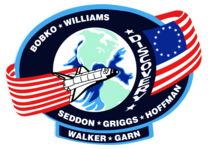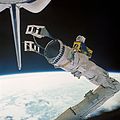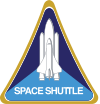STS-51-D
| Missionsemblem | |||||
|---|---|---|---|---|---|
 | |||||
| Missionsstatistik | |||||
| Missionsnavn: | STS-51-D | ||||
| Rumagentur: | NASA | ||||
| Rumfærge: | Discovery (4) | ||||
| Antal besætningsmedlemmer: | 7 | ||||
| Affyringsrampe: | LC-39A (KSC) | ||||
| Opsendelse: | 12. april 1985 | ||||
| Landing: | 19. april 1985 | ||||
| Landet på: | KSC | ||||
| Varighed: | 6 dage, 23 timer | ||||
| Foto af besætningen | |||||
 | |||||
| Navigation | |||||
| |||||
STS-51-D (Space Transportation System-STS-51-D) var rumfærgen Discoverys 4. rumfærgeflyvning. Opsendt 12. april 1985 og vendte tilbage den 19. april 1985.
Hovedformålet var at sætte kommunikationssatellitterne Anik-C1/TELESAT-l og SYNCOM IV-3/LEASAT-3 i kredsløb, men begge mislykkedes.
Besætning

 Karol Bobko (kaptajn)
Karol Bobko (kaptajn)
 Donald Williams (pilot)
Donald Williams (pilot)
 Rhea Seddon (1. missionsspecialist)
Rhea Seddon (1. missionsspecialist)
 Jeffrey Hoffman (2. missionsspecialist)
Jeffrey Hoffman (2. missionsspecialist)
 David Griggs (3. missionsspecialist)
David Griggs (3. missionsspecialist)
 Charles Walker (Nyttelast-specialist)
Charles Walker (Nyttelast-specialist)
 Jake Garn (Nyttelast-specialist) (Republikansk senator).
Jake Garn (Nyttelast-specialist) (Republikansk senator).
Missionen
Hovedartikler:
| Wikimedia Commons har medier relateret til: |
Eksterne henvisninger
- STS-51-D NASA (engelsk)
| ||||||||
| ||||||||||||||||||||
Medier brugt på denne side
Forfatter/Opretter: By Rei-artur (diskussion · bidrag)., Licens: CC-BY-SA-3.0
Venus/female symbol.
The crew assigned to the STS-51D mission included (front left to right) Karol J. Bobko, commander; Donald E. Williams, pilot; M. Rhea Seddon, mission specialist; and Jeffrey A. Hoffman, mission specialist. On the back row, left to right, are S. David Griggs, mission specialist; and payload specialists Patrick Baudry of France, and E. Jake Garn (Republican Utah Senator). Launched aboard the Space Shuttle Discovery on April 12, 1985 at 8:59:05 am (EST), the STS-51D mission's primary payloads were the TELESAT-1 (ANIK-C) communications satellite and the SYNCOM IV-3 (also known as LEASAT-3).
SVG version of PNG Space Shuttle Logo/Patch.
Deployment of the Telesat-I (Anik C-1) from the payload bay on the first day of the STS 51-D mission. Near the frame's center is the antenna for Syncom IV (LEASAT) stowed against the U.S. Navy's communications satellite. This photo was take from the aft flight deck. Earth and blackness of space share the background.
STS51D-39-007 -- On Space Shuttle Mission STS-51D, April 1985, an improvised "fly swatter" is used by the Canadarm to activate the Syncom satellite.
U.S. Senator E.J. (Jake) Garn (left), payload specialist, and astronaut Karol Bobko, mission commander, show cartoon from the Doonesbury strip of Gary Trudeau. The single enlarged panel is autographed by the crewmembers. Both men are seen sitting in the middeck area, with sleep restraints floating behind them.
Forfatter/Opretter: Rei-artur (diskussion · bidrag), reshaped by F l a n k e r (talk), Licens: CC-BY-SA-3.0
symbol of Mars. 400 × 400 pixels nominal dimensions, line 45 pixel tick, circle 295 × 295 pixel, not joined with arrow. Colour: red=0 green=0 blue=140.
![]() Vektorgrafikken blev lavet med Inkscape.
Vektorgrafikken blev lavet med Inkscape.
Rotated and color enhanced version of original (ISS013-E-48788 (6 July 2006) --- The Space Shuttle Discovery approaches the International Space Station for docking but before the link-up occurred, the orbiter "posed" for a thorough series of inspection photos. Leonardo Multipurpose Logistics Module can be seen in the shuttle's cargo bay. Discovery docked at the station's Pressurized Mating Adapter 2 at 9:52 a.m. CDT, July 6, 2006.)
The crew insignia for STS Flight 51-C includes the names of its five crewmembers. The STS 51-C mission marked the third trip of the Space Shuttle Discovery into space. It was the first Space Shuttle mission totally dedicated to the Department of Defense. The U. S. Air Force Inertial Upper Stage Booster Rocket was successfully deployed. Due to the nature of the mission, few additional details of the flight were made available. Landing was made at the Kennedy Space Center, FL on January 27 at 4:23 PM EST. Mission duration was three days, one hour and 33 minutes.


















